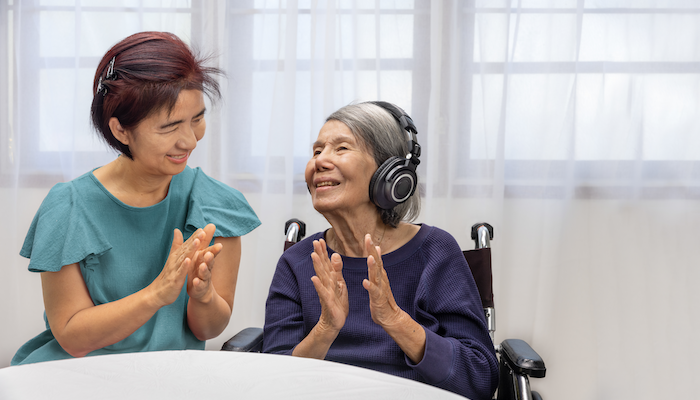Your Eldercare Compass
Helpful tips for family caregivers
January/February 2015
Music has a wonderful way of creating connections, even when you are unable to use words. In this issue, we show you how to put it to use to help you care for a loved one with memory loss. We also look at making connections in a different way: when needing to talk about a delicate subject, like your relative’s preferences for a memorial service. Finally, we urge you to do a self-assessment to determine whether you are stressed to the point of burnout. For your own health, it’s important to know!
Music and dementia care
 When caring for a relative who has moderate to advanced memory loss, it can sometimes seem like they have disappeared into their own world. How do you create connection and support their quality of life when they seem capable of so little?
When caring for a relative who has moderate to advanced memory loss, it can sometimes seem like they have disappeared into their own world. How do you create connection and support their quality of life when they seem capable of so little?
Music is proving to be one good answer to this challenge. Research shows that music is processed in parts of the brain that remain lively long after a person’s ability to “name that tune” is gone. Hearing familiar songs brings up old memories, essentially reconnecting a person to his or her sense of self and to times past.
Music can be a fun and valuable part of your caregiving toolkit. For instance, you can
- stimulate with lively tunes, especially music with a pronounced beat. This can help motivate your relative to get through tasks such as bathing and dressing.
- calm with soft, harmonious music that tends toward lullaby. Use quiet music to encourage them to take a nap or to soothe them at bedtime.
- redirect to address or avoid agitation. For instance, play favorite sing-along tunes at a time of day your relative is apt to pace or become irritable.
- connect with them through songs that prompt shared movement. Maybe dancing, or just toe tapping, swaying, or silly gestures.
You might look through some of their old records (or tapes and CDs). If the technology to play them is not available, search for the artists on a music streaming service or YouTube. You can even put together a playlist and have your relative listen with headphones.
For most purposes, strive for music that your relative knows and loves:
- Songs from childhood, with happy lyrics
- Music from youth (age 18–25), for memories of an energetic time in life
- Tunes of a favorite composer or performer that recall meaningful occasions
- Hymns and other religious music for comfort
Observe your loved one’s response to the music and make changes as needed.
Return to topStress or burnout?
 Most of us know it when we’re stressed.
Most of us know it when we’re stressed.
We talk about it, and we talk about needing to do something about it…when we have the time.
But we might not be aware when we reach the point of burnout. That’s because going numb is the nature of burnout. To be so worn out that you are beyond caring.
Put simply, burnout is stress that has gone on too long. It is an important distinction to understand. Burnout has more serious, long-term consequences for your physical health and for your emotional well-being.
Take a moment for self-reflection and assess yourself.
If you are stressed, you are
- constantly on the go, urgently trying to get things done.
- emotionally brittle, tending toward irritability and anxiety. Your thinking might be a bit scattered.
- tired and not sleeping well, rushing through leisure activities.
If you are a stressed family caregiver, you are scrambling to keep up with the demands of your role. But you believe that you eventually can get everything under control, and doing so feels important to you. Getting stress relief is a goal.
If you are burned out, you are
- doing less and less and still feeling exhausted.
- Emotionally dull and hopeless, feeling there’s no point in making an effort at anything because nothing ever changes.
- frequently physically ill, catching every cold that comes around.
- withdrawing from friends and activities and often overconsuming food, alcohol, tobacco, etc.
To put this in perspective, consider stress to be a blinking yellow light: Yield. Slow down. Find a way to weave in more breaks. Consider burnout to be a red light: Stop. You have given too much for too long. Change is needed immediately before burnout undermines your health and your ability to provide appropriate care for your loved one.
Return to top
Talking about funeral plans
One of the comforts at a time of death is knowing you are memorializing your relative according to his or her wishes. But there can be discomfort in bringing up the topic for discussion in advance.
Getting started
Choose a time when both of you are relaxed and don’t have other pressing business. Use a soft start to bring up the subject.
- Create a connection. You might start by asking about a sweet memory. “Dad, I know you’ve always loved this [possession], but I don’t remember its history. Tell me again about what it means to you.”
- Ask permission to broach a sensitive subject. “This makes me think of something else I’d like to ask about that could be a bit emotional. Can I go ahead?”
- State your concern. “My friend’s dad died recently, and everyone in the family had a different idea of what kind of memorial he would have wanted. When that time comes for you, I’d really like to feel confident that I’m doing what you would want.”
What to ask
- Has he or she already made plans? As in, written a “letter of last instruction” or even prepurchased services at a mortuary or funeral home?
- Does your relative want a traditional funeral (with casket and viewing, etc.) or something else?
- What kind of service or gathering is desired? Invite everyone? Family only? At a place of worship, at home, or at some other place of significance?
- Is there anything special your relative would like as part of the occasion? Anything in particular to be read or sung?
Your relative may brush off the subject. That is his or her right. But it’s also reasonable to mention that a funeral is for the survivors, to help them come to terms with their loss. This may open the door to further discussion.
Return to top

